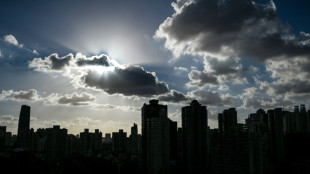
-
 Iran Nobel winner released for three weeks, 'unconditional' freedom urged
Iran Nobel winner released for three weeks, 'unconditional' freedom urged
-
Red Cross marks record numbers of humanitarians killed in 2024

-
 Johnson's Grand Slam 'no threat', says World Athletics boss Coe
Johnson's Grand Slam 'no threat', says World Athletics boss Coe
-
Qatar's emir and UK's Starmer talk trade as state visit ends

-
 Cuba suffers third nationwide blackout in two months
Cuba suffers third nationwide blackout in two months
-
Russia, Ukraine to send top diplomats to OSCE summit in Malta

-
 Spanish royals to attend memorial service for flood victims
Spanish royals to attend memorial service for flood victims
-
LPGA, USGA new policy requires female at birth or pre-puberty change

-
 Stick to current climate change laws, US tells top UN court
Stick to current climate change laws, US tells top UN court
-
British Museum chief says Marbles deal with Greece 'some distance' away

-
 Pope Francis receives electric popemobile from Mercedes
Pope Francis receives electric popemobile from Mercedes
-
Gaza civil defence: thousands flee Israeli strikes, evacuation calls

-
 Trump names billionaire private astronaut as next NASA chief
Trump names billionaire private astronaut as next NASA chief
-
Pidcock to leave INEOS Grenadiers at end of season

-
 Seoul stocks weaken, Paris advances despite political turmoil
Seoul stocks weaken, Paris advances despite political turmoil
-
South America summit hopes to seal 'historic' trade deal with EU

-
 DAZN awarded global TV rights for Club World Cup
DAZN awarded global TV rights for Club World Cup
-
Top executive shot dead outside New York hotel

-
 Vaping while still smoking unlikely to help quitters: study
Vaping while still smoking unlikely to help quitters: study
-
British Museum chief says Parthenon Marbles deal with Greece 'some distance' away

-
 'Creating connections': Arab, African filmmakers gather at Morocco workshops
'Creating connections': Arab, African filmmakers gather at Morocco workshops
-
Iran frees Nobel winner for three weeks, sparking calls for 'permanent' release

-
 Brazil's Minas cheese gets added to UNESCO list
Brazil's Minas cheese gets added to UNESCO list
-
Top US executive shot dead in New York City: media

-
 Trump's nominee to run Pentagon hangs by a thread
Trump's nominee to run Pentagon hangs by a thread
-
GM announces more than $5 bn hit to earnings in China venture

-
 World chess champ Ding, teen challenger tied past halfway mark
World chess champ Ding, teen challenger tied past halfway mark
-
Georgia police raid opposition offices as PM vows to curb protests

-
 S. Korea opposition begins push to impeach president
S. Korea opposition begins push to impeach president
-
Syrian army fights rebel offensive with counterattack

-
 France court upholds Polanski acquittal in defamation case
France court upholds Polanski acquittal in defamation case
-
UK bans daytime TV ads for cereals, muffins and burgers

-
 Palace's Guehi to face no formal action over 'Jesus' message on rainbow armband
Palace's Guehi to face no formal action over 'Jesus' message on rainbow armband
-
UK faces trade balancing act with Trump, EU

-
 Iran releases Nobel Peace laureate Mohammadi on medical leave: lawyer
Iran releases Nobel Peace laureate Mohammadi on medical leave: lawyer
-
UNESCO grants heritage status to Aleppo soap as Syria war flares

-
 Ghana's illegal mining boom seeps into presidential election
Ghana's illegal mining boom seeps into presidential election
-
Inconsistent Spurs 'progressing in all aspects': Postecoglou

-
 France's Orano says Niger junta controls uranium firm
France's Orano says Niger junta controls uranium firm
-
Seoul stocks weaken, Paris edges up tracking political turmoil

-
 China reports warmest autumn since records began
China reports warmest autumn since records began
-
French marine park to close over law banning killer whale shows

-
 Thousands march demanding S. Korea president resign over martial law debacle
Thousands march demanding S. Korea president resign over martial law debacle
-
Taiwan romance novelist Chiung Yao dies at 86

-
 In Angola, Biden promises to invest differently to China
In Angola, Biden promises to invest differently to China
-
Syrian army launches counteroffensive against rebels

-
 Evenepoel says 'long journey' ahead after postal van collision
Evenepoel says 'long journey' ahead after postal van collision
-
South Korea's day of rage as Yoon's martial law founders

-
 UK police question killer nurse Letby over further baby deaths
UK police question killer nurse Letby over further baby deaths
-
Cameroon curator Kouoh is first African woman to lead Venice Biennale


Japan government approves $140bn stimulus
Japan's minority government signed off Friday on a $140-billion stimulus drive aimed at putting more money in consumers' pockets after the ruling party's worst election result in 15 years.
The October 27 contest saw voters -- angry over corruption in the Liberal Democratic Party (LDP) and inflation -- deprive new Prime Minister Shigeru Ishiba's coalition of a majority in parliament's lower house.
The package worth 21.9 trillion yen ($141.8 billion) includes handouts of around 30,000 yen for low-income households, fuel and energy subsidies, and assistance to small businesses, according to the government.
The overall business impact was expected to be 39 trillion yen.
"To enhance the vitality of Japan as a whole, we will strengthen the growth of the national and regional economies and raise wages for all people, of all generations," top government spokesman Yoshimasa Hayashi told reporters.
To pay for the package, the second in as many years, the government will table a supplementary budget by the end of the year in the lower house.
But views about the move among people on the streets were mixed.
Voter Katsuhiro Hirakawa, 63, accused politicians of making "whatever decisions they want without listening to the voices of us ordinary citizens".
Authorities should "think carefully about why they need more tax revenue, or how they can reduce wasteful spending, before making decisions on budgets", he told AFP in Tokyo.
And Hisaki Sato, 46, wanted more help for the middle class, adding: "We're now living in an age when not only low-income households but middle-income families are in need of more stimulus measures."
The middle class is "home to many people who are contributing directly to the economy, so I want the government to cherish them as well".
- Debt mountain -
To win enough lawmakers' support, Ishiba agreed to include the lifting of an income tax threshold pushed by the opposition Democratic Party for the People (DPP).
The smaller party says this will ease labour shortages and boost consumer spending by encouraging part-time staff to work longer hours and earn more.
But critics worry that this will reduce tax revenues by trillions of yen and increase Japan's huge debt pile, which equates to more than 200 percent of gross domestic product.
With the Bank of Japan expected to keep hiking interest rates, this debt mountain will also cost more and more, SMBC Nikko Securities economist Yoshimasa Maruyama said.
Tax cuts "must be accompanied by a permanent source of revenue to fill the gap", Maruyama wrote in a research note.
Ishiba, 67, has promised to revitalise depressed rural regions and to address the "quiet emergency" of Japan's shrinking population with measures to support families such as flexible working hours.
Going forward, businesses worry that the need to curry favour with opposition parties means Ishiba will avoid reforms needed to improve Japan's competitiveness.
There are also concerns that the government may pressure the Bank of Japan to go slow on raising interest rates, even if this leads to a weaker yen.
- Rice prices soar -
Government data Friday put headline inflation last month at a modest 2.3 percent, but it showed rice up nearly 60 percent year-on-year, revealing the pain for ordinary Japanese.
The price of the staple rocketed because of hot weather and water shortages and after a "megaquake" warning in August led to hoarding. Record inflows of hungry tourists were also blamed.
Separately, Ishiba has promised to spend 10 trillion yen through 2030 to boost Japan's semiconductor and artificial intelligence sectors and help the nation regain its tech edge.
After dominating tech in the 1980s, "Japan had quite a long period of almost just sitting back and observing a lot of this innovation," particularly in artificial intelligence, said Kelly Forbes at the AI Asia Pacific Institute.
"What we have seen in the last maybe two to three years is Japan really waking up to the potential" of such developments, she told AFP.
R.Adler--BTB
